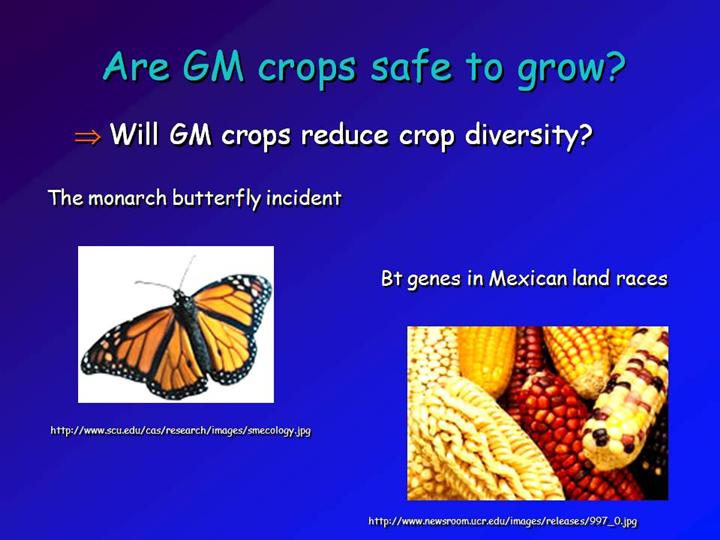| front |1 |2 |3 |4 |5 |6 |7 |8 |9 |10 |11 |12 |13 |14 |15 |16 |17 |18 |review |

http://www.scu.edu/cas/research/images/smecology.jpg http://www.newsroom.ucr.edu/images/releases/997_0.jpg
|
But will GM crops reduce biodiversity? The biodiversity issue has two aspects. Some people mean crop biodiversity and others mean the diversity of species other than crop plants. Both of these are important, but rather different issues. A story that captured headlines a few years ago was that larvae of monarch butterflies died when fed corn pollen from Bt corn plants in the laboratory. This is not a surprise, since these butterflies are closely related to the insect pests that Bt was introduced to control. But butterflies don’t eat corn pollen, they eat milkweed, which generally doesn’t grow in farmers fields. Nonetheless, in response to the worldwide concern that this story aroused, a very large study was done to assess the potential impact of Bt corn pollen on monarch butterfly larvae in the field. The study stretched from Maryland to Canada and measured everything imaginable: how far corn pollen goes from fields, how much milkweed is in and near fields, and so forth. The results were published in five back-to-back papers in the Proceedings of the National Academy of Sciences. Their conclusion was that in the worst case scenario they construct, only one out of 2500 larvae might be affected. This compares with the 90% or more deathrate caused by a conventional pesticide. Another story in news several years ago was that Bt genes, which come from a bacterium and were introduced into corn by molecular techniques in companies like Monsanto, were discovered in Mexican land races. These are the colorful indigenous corn varieties grown in Mexico. Farmers that grow these strains are constantly selecting them for how they look and how well they grow. Detection of the Bt gene is viewed by some as “genetic contamination.” This is not a very clear issue, since these strains are not well-defined genetically. While some argue that introducing a Bt gene reduces their value, it could equally be argued that adding a Bt gene would be good for farmers, since it would reduce their pesticide requirements. |